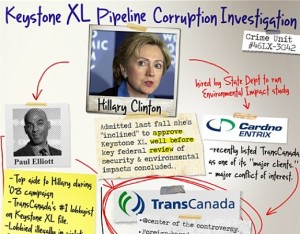Note: See our new infographic on Keystone XL here!
At Friday’s electric final hearing into the proposed controversial Keystone XL pipeline, one of the recurring themes was that the US State Department has consistently taken sides with TransCanada, the company building the pipeline, even before the consultation has finished.
Such was the clamour of accusatory noise that it forced Kerri-Ann Jones, the State Department’s point person to issue a sharp rebuttal.
“We are running an objective process,” Jones said, adding “We are impartial. We are in listening mode. We have not made a decision and we are not leaning in any one direction.”
Well that denial has been blown out of the water with the revelation that Kerri-Ann Jones’ State Department actually assigned an important Environmental Impact Assessment (EIA) study of the proposed Keystone XL pipeline to a company with financial ties to TransCanada.
According to the New York Times, who broke the story, this “flouts the intent of a federal law meant to ensure an impartial environmental analysis of major projects.”
The State Department was so “objective” in its procedures that it allowed TransCanada to “ solicit and screen bids” for the EIA study.
The final contractor chosen – Cardno Entrix – was even recommended by TransCanada despite the fact that it had worked on projects with the pipeline company which it describes as a “major client” in its marketing materials.
This is a huge conflict of interest and should be a show-stopper for the pipeline.
Cardno Entrix’s study – not surprisingly – found that the pipeline would have “limited adverse environmental impacts” if operated according to regulations, which downplays the local risks of pollution along the pipeline route. More importantly it ignores the potentially catastrophic risks to the climate of developing the tar sands.
For example, the US Environmental Protection Agency has criticized two EIAs prepared by Cardno Entrix on the pipeline as “inadequate” and providing “insufficient information.”
Professor Oliver Houck, a law expert at Tulane University told the New York Times that Cardno Entrix should never have been selected to perform the environmental study on Keystone XL because of its relationship with TransCanada.
Cardno Entrix had a “financial interest in the outcome of the project,” Houck said, adding, “Their primary loyalty is getting this project through, in the way the client wants.”
So when Kerri-Ann Jones argues “We have done an objective environmental impact statement,” you know that this is not the case.
Just as you know that the State Department has not been impartial.
The only way to restore trust in the process is to undertake a new EIA with a company that has no financial ties to TransCanada and one that the pipeline company has not recommended.

